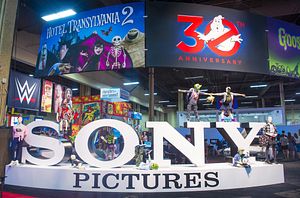Could pulling the plug on what seems to be a fairly mediocre film be a blessing in disguise for Sony?
For investors already wary about the electronic giant’s future, Sony Pictures’ decision to postpone the release of its latest comedy about an assassination attempt on the pariah state’s leader may simply be its final death knell. But if it plays its cards carefully, Sony may actually be able to win public sympathy and even trust from its decision to hold off releasing the movie about an assassination attempt on Kim Jong-un amid worries about safety concerns for theatergoers.
A bevy of A-list names from Rob Lowe to Aaron Sorkin have been quick to weigh in how Sony’s decision to cancel showing the film, and how the decision not to show The Interview, which stars Seth Rogen and James Franco, is in effect a capitulation by the West to the diktats of the North Korean regime.
But perhaps the most practical and game-changing response has come from none other than former presidential hopeful Mitt Romney. In a tweet to Sony Pictures, he advised that the company make the movie available “free online globally. Ask viewers for voluntary $5 contribution to fight #Ebola.” In fact, that could possibly be a very clever way for Sony not only to justify some of the $42 million it has sunk into the project, but also to reverse its tarnished image.
For 2014 has no doubt been an annus horribilis for the Japanese electronics manufacturer, whose fate seemingly has echoed the country’s economic woes.
At the beginning of the year, Sony’s debt rating was downgraded to junk status by credit rating agency Moody’s, amid worries that its earnings would remain “weak and volatile,” and profits would continue to tumble. Soon thereafter, the company announced that it would retreat from the PC business and stop producing its Vaio line of laptops and computers. The company that once rocked the world by redefining youth culture with the Walkman and then charmed it with its Aibo robot dog no longer had any mega-hits that could compete with either Apple or Samsung.
One exception to the string of disappointments had been Sony’s foray into Hollywood.
Founded in 1991 after Sony acquired Coca-Cola’s stake in Columbia Pictures, Sony Pictures Entertainment was initially greeted warily by the movie industry, skeptical of the ability of a Japanese conglomerate to become a powerhouse of cinematography. Over the years, however, Sony Pictures has become the group’s crowning glory, with blockbusters like Spiderman and Men in Black adding much-needed glamor to the parent company. The cancellation of The Interview’s opening on Christmas Day has been a particularly big blow to the company, and not just because it could lose as much as $100 million in box office sales worldwide, according to some industry analysts.
For one, the massive and widely publicized hack by North Korea supporters – or by the government itself – has exposed corporate management’s pettiness and arrogance, not to mention some gross inequality. Moreover, given the sheer volume and nature of the information that was revealed, it will be no easy feat for the company to recover from the loss of data and exposure of weaknesses, or from the negative impact on its corporate culture.
More devastating, though, is the revelation that Sony’s management in Tokyo was actively engaged with executives at Sony Entertainment’s Culver City headquarters in the creative process. While the studio has proclaimed autonomy from the Japanese parent company, email exchanges revealed by the hack clearly show that CEO Kazuo Hirai himself was fully immersed in the editing process, trying to tone down the final scenes of Kim Jong-un’s demise as he fretted about how the portrayal could further damage relations between Japan and North Korea.
Still, this could be an opportunity for Sony to recast itself as a company that actually is sensitive to the power of entertainment, and that does not take to wielding its soft power lightly. Much as Sony could be accused of caving in to North Korean pressure, it could equally recast itself as the company that is sensitive to the repercussions of its works, and is not willing to risk exposing people to potential terrorist threats for profit.
After all, Hollywood always loves a comeback kid, someone who can defeat the odds, and Sony could well be in a position to do just that. Heeding Mitt Romney’s advice and showing The Interview online for contributions to an Ebola fund could certainly win over a new generation of fans.
Shihoko Goto is the senior Northeast Asia associate at the Woodrow Wilson International Center for Scholars’ Asia Program based in Washington DC.
































